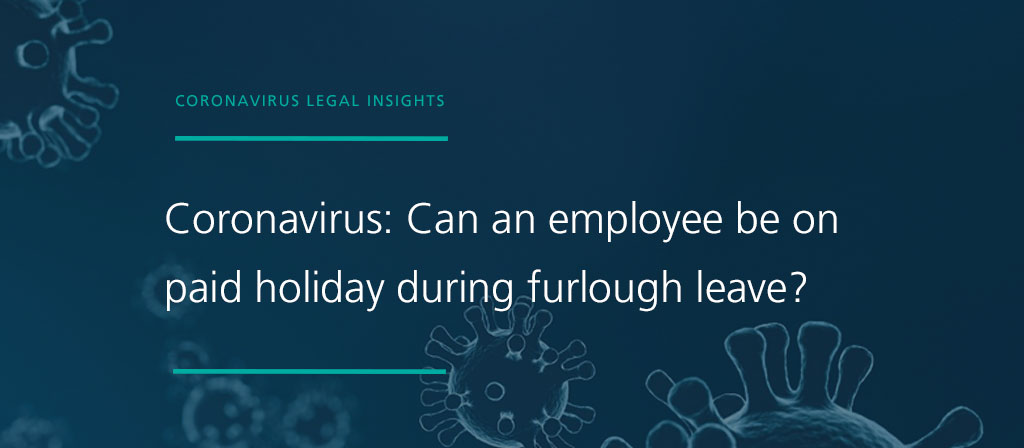Coronavirus: Furlough leave and holidays

One of the big unanswered questions which has been exercising the minds of HR professionals and employment lawyers alike since the announcement of the government’s Coronavirus Job Retention Scheme (CJRS), is how annual holiday entitlement interacts with furlough leave.
The picture is an ever-changing one, and since the time of writing, this issue has now been clarified by HMRC. Please refer to our comment on the updated position here.
There is much conflicting opinion out there, and unfortunately very little concrete guidance from government on which to base it.
In this summary our employment lawyers outline their opinion of what they think the answer is, or should be, and some practical suggestions of how to deal with the issue whilst mitigating the risks if it transpires that this approach is wrong! As always, we are here to help so please contact any of the team should you have any queries.
Does statutory annual holiday continue to accrue during furlough leave?
Yes, we (along with most commentators) think it does, in the same way that it continues to accrue during maternity leave and long-term sickness absence.
Can annual holiday be taken during furlough leave?
This is where the real divergence of opinion lies. ACAS guidance is contradictory on the point, and HMRC guidance is silent on the question. It’s an important one, because if HMRC takes the view that annual holiday is incompatible with furlough, it could have two consequences.
Firstly, a claim for a grant under the CJRS in respect of a period of annual holiday might be invalid, might lead to penalties, and/or might subsequently have to be repaid.
Secondly, and more seriously, if a period of annual holiday falls during the minimum three-week period of furlough, it could invalidate that furlough leave altogether, meaning that the entire CJRS claim might not be reimbursed by HMRC or, if already paid, might be recouped, and penalties might be imposed.
Of course, for many employees, this will also apply in respect of the bank holidays over the Easter period. Fortunately, whilst writing this article, HMRC has confirmed (on 8 April 2020) that furloughed employees can take their bank holidays as usual over the Easter period and a claim can still be made on the CJRS in this respect. In our view this makes it safer to assume that the same principles will apply to any other annual leave – but this still remains to be confirmed.
In any event, there are also strong HR policy reasons for taking the view that annual holiday can be taken during furlough leave. Employees furloughed on 80% of their salary might wish to augment their furlough pay by booking a period of annual holiday for which they will be paid 100% (see below). Reminding them of this fact also has the neat side-effect of reducing the glut of holiday requests which we are all likely to receive later in the year.
Our suggestion is that staff should be permitted, and perhaps even encouraged, to book holiday during furlough leave, for these reasons, and that if employees would normally have the Easter bank holidays as annual holiday, they should be treated as such. If it subsequently transpires that this approach is incorrect, then it may be necessary to ‘reverse’ the holiday booking within your HR systems so that it can be taken after the furlough leave has ended.
If you have topped up their pay to 100% for any annual holiday taken during furlough leave, then you may wish to agree in writing with the employee that you can deduct the 20% ‘top up’ from future salary payments, if it subsequently transpires that the holiday during furlough has to be reversed in retrospect. Whether or not you do this is really an employee relations decision.
This suggested approach comes with a health warning, in that it assumes that clarity will emerge about whether annual holiday can lawfully (i.e. within the rules of the CJRS) be taken during furlough leave, before HMRC gets around to auditing your claims under the scheme!
What should employees be paid for holiday pay during furlough leave?
Again, there is divergence of opinion on this question. There are arguments supporting the idea that employees with regular hours and pay who have agreed to reduce to 80% pay during furlough leave now have a new ‘normal remuneration’ (i.e. 80% of their previous) which is what they should receive as holiday pay. However this wouldn’t apply to employees without normal working hours and/or with variable pay, whose holiday pay (for periods of statutory holiday entitlement) would have to be based on an average of the last 12 months in any event.
Other commentators take the view that, in line with EU case law which says that workers must receive ‘normal remuneration’ during annual leave, that ‘normal remuneration’ should be 100% rate, as it relates to the last period when the employee was undertaking work – at least for the EU minimum holiday period of 4 weeks per annum.
Regardless of the legal arguments, we think there are strong HR policy reasons for paying staff 100% of their salary/wages for any holiday taken during furlough leave, if you can afford it. Firstly it provides a way for staff to augment their furlough pay, by booking holiday during furlough leave. Secondly it operates to reduce the amount of holiday which will remain to be taken later in the year, after furlough leave has ended, when there is likely to be lots of pressure on your holiday system and when you probably actually need everyone to be at work!
Our conclusions
We may well receive guidance from HMRC in due course on whether annual holiday is compatible with furlough leave. However we are not expecting HMRC to comment on what level of holiday pay employees should receive during furlough leave. The latter is really an employment law question which falls to be determined in the employment tribunals; and it will take many months, if not years, for those cases to work through the system.
There are many unknowns at present. The priority must be to take prompt, but well-considered, actions in order to safeguard your business, and a pragmatic approach which serves your aims. We hope that the thoughts in this article will help you with that, but please don’t hesitate to contact us on any of the usual channels if you would like more specific guidance.
We’re here to help
We appreciate that it is a confusing and uncertain times for employers, but we’re here to help.
Our employment law team is fully equipped to advise you on your rights and obligations in this most unusual situation and how best to implement this guidance across your workforce.
Our legal services are operating as normal, with all of our lawyers able to work safely from home.
Please call 01242 514000 or email our lead employment partner on matthew.clayton@willans.co.uk and we will be delighted to help.
We’re regularly updating our website with more COVID-19 legal insights, so keep an eye on willans.co.uk/insight for the latest legal perspectives relating to the coronavirus.
Contact
Matthew Clayton MA LLM (Cantab), CIPP/E
Partner
View profile


Related services
Share this article
Home Office begins eVisa rollout
The Home Office has started to roll out eVisas, with their aim being to have replaced physical visas or biometric residence permits (BRPs) by 2025. The Home Office has started…
Hayley Ainsworth BA, MSc
Associate, solicitor

Flexible working is here to stay from 6 April 2024
From 6 April, flexible working laws are changing, making it easier for employees to make statutory flexible working requests. The Employment Relations (Flexible Working) Act 2023 will make the following…
Hayley Ainsworth BA, MSc
Associate, solicitor

Business Immigration: Significant changes to take place in April 2024
Last December, the Home Secretary announced a five-point plan to reduce immigration in the UK, with most measures to be implemented early this year. Tomorrow, these significant changes to business…
Klára Grmelová MGR (LLM Czech)
Solicitor









